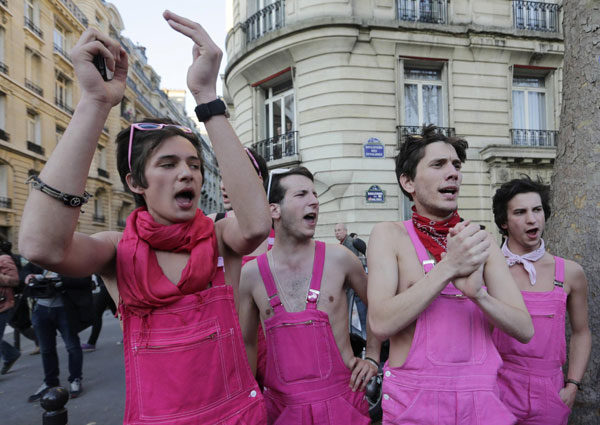Gay marriage: Britain, France in surprise contrast
The picture was completely different in France. Few people had expected legalizing gay marriage to face much of a hurdle. French polls had shown for more than a decade that the concept enjoyed majority public support, and Paris has had a gay mayor for years.
 |
|
People wearing pink overalls attend the "La Manif pour Tous" (Demonstration for All) protest march against France's legalisation of same-sex marriage, in Paris, April 23, 2013. French parliament approved a law allowing same-sex couples to marry and to adopt children on Tuesday, a flagship reform pledge by French President which sparked often violent street protests and a rise in homophobic attacks. The law legalises gay marriage and gives gay and lesbian couples adoption rights. [Photo/Agencies] |
And to outsiders, of course, France is seen as the land of "anything goes" when it comes to sex - from the Marquis de Sade to author Colette to disgraced French politician Dominique Strauss-Kahn, notorious for his libertine sex parties.
Politically, too, it was meant to be a blip. Legalizing gay marriage was near the bottom of French President Francois Hollande's 36-point agenda for his presidency. It was mentioned in passing during his presidential campaign but was never an issue that galvanized opposition, and was entirely eclipsed by concerns about the economy.
Then, something clicked in the conservative heartland - which showed just how much of a force it is in French life.
When the law was drafted and the idea of gays marrying turned from concept to imminent reality, traditionalists spoke up, and loudly. Protests grew bigger, and spread wider. Opponents of the bill stirred up fears about gay parents raising France's new generations.
A fringe of far-right skinheads drew camera crews and condemnation as they wrestled with riot police at Paris protests. But most of those at the barricades were families, children with grandparents, members of France's minority of practicing Catholics bussed in en masse from towns and villages to march on the capital. Some conservative Muslims and Jews joined in.
In marching against gay marriage, the demonstrators also seemed to be protesting freewheeling Paris life, the image of a wanton, insatiable French sexuality celebrated in films and art - but far from the reality of many provincial French families. For a time in early 2013, France felt like a deeply divided nation.
But the size of the anti-gay marriage movement was largely the result of a political backlash against Hollande, whose popularity dived soon after his election over his handling of the economy.
The movement was the right vehicle at the right time to target Hollande and his Socialists. Once the law passed, the momentum stalled.
Even the protesters seemed to realize they remain the minority, and polls continue to show that most French people think gay marriage - now that it is a fact of life - is fine.





















